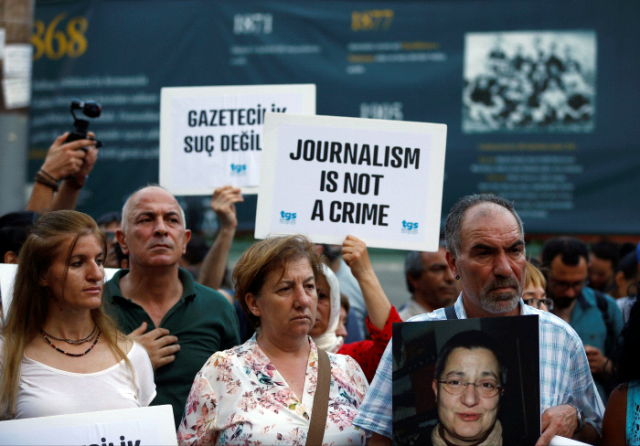
The media crackdown in Turkey by the regime of President Recep Tayyip Erdogan has grown in the aftermath of a failed coup in July last year.
Jailed reporters find themselves caught in a quagmire as they face legal limbo and deal with made-up charges, inhumane treatment and solitary confinement.
The opposition Republican People’s Party (CHP) said that since the coup attempt, 152 journalists have been jailed and 173 media outlets have been shut down, including newspapers, magazines, radio stations, websites and news agencies.
More than 2500 journalists have been laid off due to these closures and 800 have had their press credentials revoked. Many have also had their passports confiscated.
For its part, the government only acknowledges that 30 journalists are in jail. The rest, Erdogan says, are terrorists.
In a statement, the president claimed: “Only two of the 177 people in prison who declared their profession to be journalism have yellow press cards. One of these 177 is in prison for murder, while the rest are there because of their ties to terrorist organisations.”
Human rights groups have repeatedly urged the government to release all journalists. Many outlets of the minority Kurdish community have been shut down, or have reopened with different names after being accused of propaganda on behalf of the Kurdistan Workers’ Party (PKK) armed group.
The Committee to Protect Journalists said that last year, Turkey accounted for a third of all journalists jailed worldwide.
Journalists in Turkey have been tried for reporting the facts during successive military regimes. In the past decade, Erdogan himself has sued thousands of critics for insulting him, many of them journalists.
The allegation against those detained is often that the journalists are linked to the Gulen movement that the government accuses of being behind the failed coup.
The indictments against many known journalists include their professional contacts and correspondence with suspected Gulen supporters as proof of their guilt.
“All my relationships with the people that you mention were within the framework of my job as a journalist,” jailed journalist Nazli Ilicak said in her defence statement on June 26. At the time she spoke with them, she added, “they were not yet declared members of a terrorist organisation”.
There can be no escape, as rulings favourable to accused journalists are often used as evidence that the judges are themselves tied to the coup.
Earlier this year, a court ordered the release of several journalists. However, the decision was reversed after the suspension of the judges involved.
[Reprinted from TeleSUR English.]
Like the article? Subscribe to Green Left now! You can also like us on Facebook and follow us on Twitter.